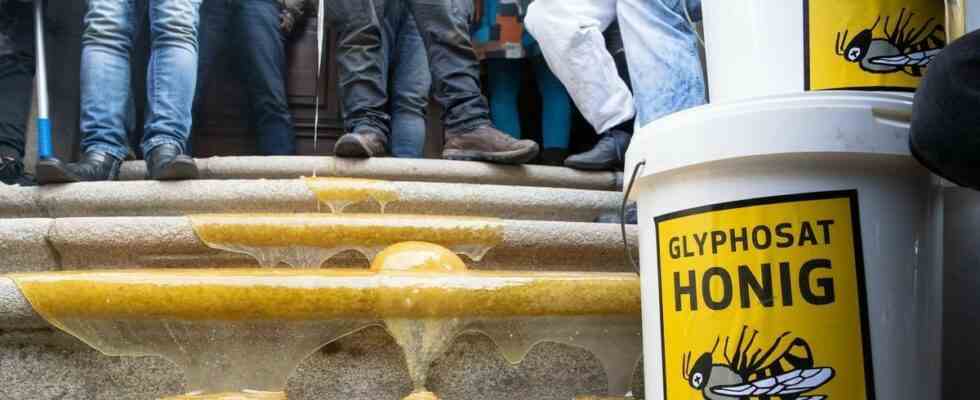The joy is still restrained. “I’m happy about the stage success. It’s nice to hear that we’re right,” says Sebastian Seusing, 48, on the phone. He does not know whether the defendant will go to the next instance. Seusing has become cautious, the process has been dragging on for too long. The district court in Frankfurt (Oder) on Monday agreed to the lawsuit brought by the professional beekeeper against the agricultural company Stadt Güter Berlin Nord KG and sentenced it to 14,544 euros in damages plus interest. Working in one of his fields, Seusing’s honey was so heavily contaminated with glyphosate that he had to destroy a good half a ton. The verdict is not yet legally binding.
In the spring of 2018, Seusing set up 29 bee colonies on the edge of a field planted with alfalfa in Brandenburg, where he lived at the time, which is managed by Stadtgüter Berlin Nord KG. In April 2019, their employees sprayed a pesticide containing glyphosate. The herbicide, which is manufactured by the Dax group Bayer, among others, destroys all plants unless they are genetically modified in such a way that the poison cannot harm them. “The beehives were clearly visible in the forest on the edge of the field,” says Seusing: “It wasn’t about the dandelions in the alfalfa field, but about the locust trees in the forest.” Dandelion and robinia blossoms are a feast for bees.
The insects carried loaded nectar and loaded pollen into the hive. According to Seusing, several laboratory analyzes of the honey showed that the maximum permissible residue levels for glyphosate were exceeded by a factor of up to 152. The limit is 0.05 milligrams per kilogram. In reality, the damage was much greater than the 510 kilos of honey, says Seusing. He also had to have the yields of 60 other colonies destroyed because of the glyphosate contamination, a total of 4000 kilograms, a third of the entire harvest. These 60 peoples were just three kilometers away from the field and were not the subject of the proceedings. Seusing put the total damage at 70,000 euros, which he initially had to bear himself.
The court “fully upheld” the beekeeper’s complaint, according to a spokesman for the court. The reason given by the court was that “the contamination of the products in the beehives with glyphosate constituted an illegal infringement of property”. The court “found a negligent breach of duty on the part of the farm because the beehives were clearly set up for the defendant”. For Seusing’s lawyer Georg Buchholz, the judgment is a victory “all along the line” and a judgment of fundamental importance because it clarifies the claims of beekeepers.
A picture from earlier days. The married couple Sebastian and Camille Seusing taking honey.
(Photo: Florian Zimmer-Amrhein/PR)
“Many beekeepers don’t even complain because the process is too expensive for them,” says Thomas Radetzki, CEO and initiator of the Aurelia Foundation, which is committed to nature conservation and bees in particular. She paid Seusing’s costs for the procedure. “The wild and pollinators must be better protected, says Radetzki, himself a beekeeper. He calls for a complete ban on pesticides during the flowering of plants, bees are everywhere.
Stadt Güter Berlin Nord KG did not want to comment on the verdict on Monday, but would rather wait for the reasoning behind the verdict and then decide whether to appeal the verdict. The private company has leased the area since 2007 from Berliner Stadt Güter GmbH, a real estate company of the State of Berlin that manages a total of 16,000 hectares in Brandenburg. According to a spokeswoman, the areas are to be cultivated “according to good agricultural practice”. The Berlin city estates did not want to comment on the verdict on Monday.
Glyphosate has been the subject of criticism for many years. In the US, thousands are suing Bayer, which got into trouble with its 2018 takeover of Monsanto. Comparisons cost the company billions. All legal disputes have not yet been settled.
The Seusing family has not lived in Brandenburg since the beginning of 2021. At the verdict, Seusing was not in Frankfurt on Monday. The honey business had become too risky for him. Seusing sold the company, the facility, the colonies. He now works as an employee on an organic suckler cow farm in Schleswig-Holstein. It’s a beautiful farm, says Seusing: “But I still mourn my beekeeping. Our family made a good living from it, for twelve years. The loss was quite a blow.”

